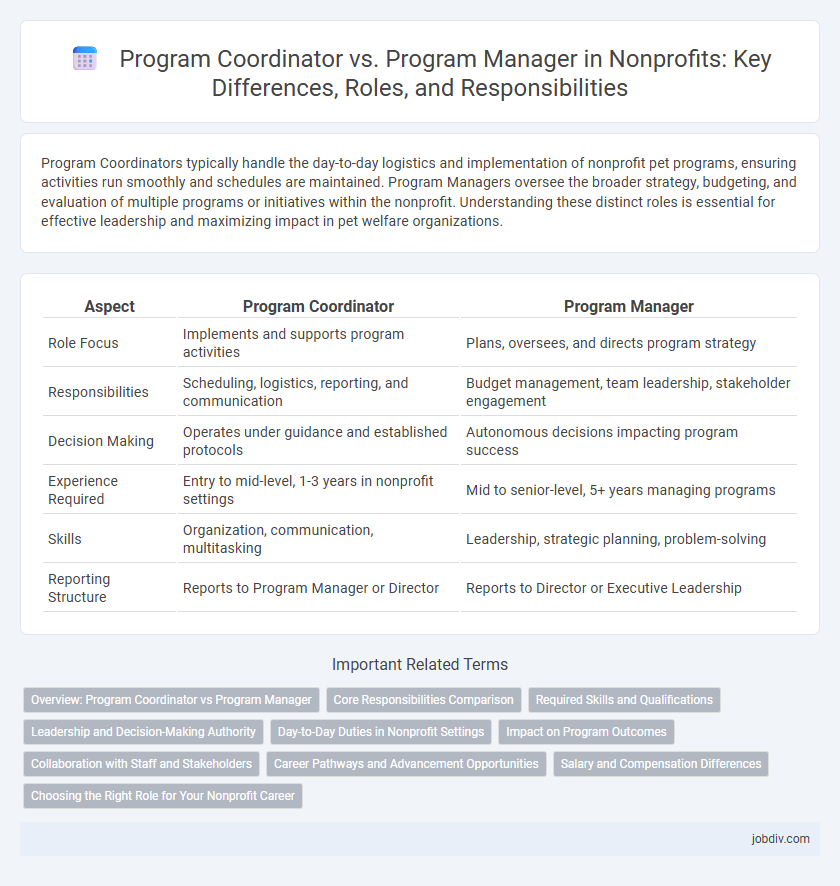Program Coordinators typically handle the day-to-day logistics and implementation of nonprofit pet programs, ensuring activities run smoothly and schedules are maintained. Program Managers oversee the broader strategy, budgeting, and evaluation of multiple programs or initiatives within the nonprofit. Understanding these distinct roles is essential for effective leadership and maximizing impact in pet welfare organizations.
Table of Comparison
| Aspect | Program Coordinator | Program Manager |
|---|---|---|
| Role Focus | Implements and supports program activities | Plans, oversees, and directs program strategy |
| Responsibilities | Scheduling, logistics, reporting, and communication | Budget management, team leadership, stakeholder engagement |
| Decision Making | Operates under guidance and established protocols | Autonomous decisions impacting program success |
| Experience Required | Entry to mid-level, 1-3 years in nonprofit settings | Mid to senior-level, 5+ years managing programs |
| Skills | Organization, communication, multitasking | Leadership, strategic planning, problem-solving |
| Reporting Structure | Reports to Program Manager or Director | Reports to Director or Executive Leadership |
Overview: Program Coordinator vs Program Manager
A Program Coordinator in nonprofits typically handles the day-to-day administrative tasks, scheduling, and communication to support program delivery, ensuring that project goals align with organizational objectives. In contrast, a Program Manager holds a strategic role overseeing multiple projects, managing budgets, developing program goals, and measuring outcomes for long-term impact. The distinction centers on operational execution for Coordinators versus strategic planning and leadership for Managers within nonprofit program structures.
Core Responsibilities Comparison
Program Coordinators primarily handle the day-to-day logistics and support tasks such as scheduling, communication with participants, and resource allocation in nonprofit initiatives. Program Managers focus on strategic planning, budgeting, evaluation of program outcomes, and leading teams to ensure alignment with organizational goals. The distinction in core responsibilities highlights Coordinators' operational role versus Managers' leadership and decision-making authority in nonprofit program execution.
Required Skills and Qualifications
Program Coordinators in nonprofits often require strong organizational skills, attention to detail, and proficiency in communication tools, with a background in project support or administration. Program Managers demand advanced leadership capabilities, strategic planning expertise, and experience in budgeting and stakeholder management, supported by a degree in nonprofit management or related fields. Both roles benefit from knowledge of grant writing, data analysis, and familiarity with nonprofit software platforms like Salesforce or Blackbaud.
Leadership and Decision-Making Authority
Program Managers in nonprofits hold higher leadership roles with decision-making authority over program strategy, budgeting, and staff supervision. Program Coordinators support these efforts by managing daily operations, coordinating activities, and reporting progress but have limited autonomy in strategic decisions. Effective program leadership depends on clear distinctions in responsibility, where managers drive organizational goals and coordinators ensure efficient implementation.
Day-to-Day Duties in Nonprofit Settings
Program Coordinators in nonprofits focus on executing daily activities, managing schedules, and directly supporting program delivery, ensuring smooth operations and effective communication among team members. Program Managers oversee broader program strategies, budgeting, staff supervision, and outcome evaluations to align projects with organizational goals and secure funding compliance. Both roles are essential but vary in scope, with coordinators handling tactical tasks and managers driving strategic program success.
Impact on Program Outcomes
Program Coordinators streamline daily operations and ensure effective communication among team members, directly enhancing program efficiency and consistency. Program Managers oversee strategic planning and resource allocation, driving overall program success and alignment with organizational goals. The combined efforts of coordinators and managers significantly boost program outcomes by balancing detailed execution with long-term vision.
Collaboration with Staff and Stakeholders
Program Coordinators facilitate communication and organize daily activities to ensure seamless collaboration among nonprofit staff and external stakeholders. Program Managers oversee strategic planning and coordination, fostering partnerships that align with organizational goals and drive program success. Both roles require strong interpersonal skills to maintain effective teamwork and stakeholder engagement.
Career Pathways and Advancement Opportunities
Program Coordinators in nonprofits typically handle day-to-day operations and support program execution, serving as entry-level roles that build foundational skills in project management and stakeholder communication. Program Managers oversee strategic planning, budgeting, and team leadership, representing a mid-to-senior career stage with expanded responsibilities and decision-making authority. Advancement opportunities often involve moving from coordinator to manager roles, then advancing to director or executive positions, with leadership development and cross-functional experience playing critical roles in career progression.
Salary and Compensation Differences
Program Coordinators in nonprofits typically earn between $40,000 and $55,000 annually, reflecting entry to mid-level responsibilities, while Program Managers command higher salaries ranging from $60,000 to $85,000 due to their strategic oversight and leadership roles. Compensation packages for Program Managers often include performance bonuses, healthcare benefits, and retirement plans, which are less common for Coordinators. Salary disparities also depend on organization size, geographic location, and program complexity within the nonprofit sector.
Choosing the Right Role for Your Nonprofit Career
Program Coordinators in nonprofits focus on managing day-to-day activities, ensuring smooth program execution and direct support to staff and participants, which suits professionals seeking hands-on operational roles. Program Managers oversee broader strategic planning, budgeting, and evaluation, leading multiple projects and aligning programs with organizational goals, ideal for those aiming for leadership and decision-making positions. Choosing between these roles depends on your career goals, whether you prefer detailed coordination work or strategic management within the nonprofit sector.
Program Coordinator vs Program Manager Infographic

 jobdiv.com
jobdiv.com